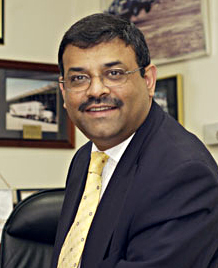
Exclusive—Reaction
has been fast and furious as an October 30th deadline looms and countdown
begins for yesterday’s stunning news out of Germany: Europe’s
most important air cargo gateway is facing total annihilation as the
result of a local judge’s ruling, demanding all night flights
be terminated at Frankfurt International Airport.
The word came down just barely two weeks
before the opening of the gateway’s new runway.
Terming October 11 “Black Tuesday,”
many air cargo people are wondering if it is even possible for Germany
to allow a single individual to affect so many lives and incomes worldwide.
 Peter
Marx, (left) the vice president of environmental management at Fraport,
slammed the decision as “a big mess” during a speech at
the Smart Airports, going on this week in Munich. Peter
Marx, (left) the vice president of environmental management at Fraport,
slammed the decision as “a big mess” during a speech at
the Smart Airports, going on this week in Munich.
Mr. Marx, right on the mark overstating
the obvious, said that the closure would be a “big, big mess
for cargo operations in particular.
“There are just two weeks to go
before Frankfurt Airport opens its new runway and night flights have
already been cancelled.
“As we know, noise abatement is
the most important thing for airport operators when it comes to green
initiatives, but no night flights between 11pm and 5am will cause
a big, big mess for cargo handlers.”
The administrative supreme court of
Hesse has banned night flights at Frankfurt Airport after complaints
from residents, and has said the ban would start on October 30th with
the new winter flight schedule.
Meantime, Lufthansa stated that “to
implement such a ban at short notice will have significant economic
consequences.”
It is no surprise that Lufthansa is
reportedly looking into possible legal measures, even though the Hesse
court said in its statement no legal recourse was available.
Lufthansa upped the stare down with
Hesse, saying:
“As far as we are concerned, the
permitted movements are still valid until the decision of the Federal
Administrative Court in Leipzig.”
The Leipzig court is slated to make
its decision on night flights at Frankfurt Airport in the beginning
of 2012.
 Neel
Shah, (right) Senior Vice President & Chief Cargo Officer for
Delta Cargo, may not be an all cargo operator, but as top cargo executive
of the biggest airline in the world, he is watching developments closely
whilst planning for any eventuality. Neel
Shah, (right) Senior Vice President & Chief Cargo Officer for
Delta Cargo, may not be an all cargo operator, but as top cargo executive
of the biggest airline in the world, he is watching developments closely
whilst planning for any eventuality.
“In general, I believe that the
night ban will have a dramatic impact in the medium to long term on
FRA as forwarders move their business and consolidations to gateways
with a more freighter friendly operating stance.
“The other major gateways in Europe,
such as AMS and CDG, could potentially see a big jump in volume if
the German Federal Court upholds the lower court decision.
“Being a belly only carrier, the
ban doesn't impact our operation, so we will be watching how it affects
the local community and then take any appropriate action.
“We have already begun talking
with our major customers to see how we can partner with them to try
and mitigate the loss of direct nighttime freighter lift exit FRA
and offer them more capacity on the Delta belly network.
“Taking a broader view, I believe
that this is just another body blow that our industry has to absorb
on top of the additional security measures and emissions trading schemes.
“I’m not sure why everyone
feels the need to pick on the airline industry, because we provide
an invaluable service to the world community and make very thin margins
at the end of the day.”
We asked Neel Shah if he thinks air
cargo will have to change the way it does business and no longer be
a "night animal?"
“Possibly, but at the end of the
day I believe that the action by the lower court of Hesse will probably
be contained and a compromise solution will be reached that provides
some victory to all stakeholders.”
Vienna-based cargo-partner turned over
half a billion euros in 2010 and employs 2,300 staff worldwide, among
them 180 in Germany.
The agent’s main gateway for air
freight is Frankfurt.
 Stefan
Krauter, cargo-partner, told FlyingTypers: Stefan
Krauter, cargo-partner, told FlyingTypers:
"I recommend German authorities
and politicians to look beyond the horizon.
“By doing so, they will see where
their airlines' and airport's real competitors are – at the
Gulf region.
“Shutting down central hubs like
Frankfurt at night helps Dubai and others, but harms the aviation
and logistics industry of Europe's leading economic powerhouse.
“The court's banning of night
flights at times where the crisis in Europe and also in other markets
spreads steadily is more than problematic and, to my understanding,
counterproductive.
“It's similar to a slower, rolling
car with somebody stepping additionally on the brakes.
“By stating he ‘can't see
any reason why these (night) flights cannot be conducted at day times,’
the judge reveals little knowledge of interdependent global economic
processes.
“Somebody that is used to handing
down verdicts all the time has probably lost his sensibility for negative
consequences resulting from decisions such as the night flight curfew
for shippers, forwarders, handling agents and cargo carriers alike.”
Besides the economic impact, a number
of environmental problems are also caused by the judges’ ruling.
“Since many goods will have to
be trucked over longer distances from their German points of origins
to airports in the Netherlands, Belgium or France that offer 24/7
traffic, the greenhouse gas emissions will increase and the highways
additionally jammed as more traffic is inevitably produced.
“As a matter of fact, we at cargo-partner
will increasingly utilize airports in the Benelux countries instead
of Frankfurt for our imports that are bound to Eastern Europe.
“Again, this causes additional
trucking and carbon dioxide emissions, but the ruling of the judges
in Hesse State leaves our company no alternative for moving our air
freight.”
 Taking
a bit of a different tack, Ram Menen, (right) Divisional Senior Vice
President Cargo at Emirates, said this of the Frankfurt night ban: Taking
a bit of a different tack, Ram Menen, (right) Divisional Senior Vice
President Cargo at Emirates, said this of the Frankfurt night ban:
“It is sad that Germany is going
to implement night ban.
“Cargo is a night animal; night
flying is the most efficient for overnight deliveries.
“Having said that, most European
airports that we operate to have night ban of some sort, so our schedules
are set in such a way that we tend to get in and out of European airports
before the ban sets in, or schedule to arrive when the airports reopen
in the morning.
“Hence, we are not very affected
by this ban in Frankfurt.
“Night flying, of course, would
give us more flexibility in scheduling.
“Integrators who tend to have
next day delivery are the folks who are going to be most affected.
“Home-based carriers will also
have a challenge as the window of operational flexibility will get
narrowed.
“We will, probably, see carriers
who operate/rely on night time operations starting to move towards
airports like Frankfurt-Hahn, Cologne, Liege, etc. who don’t
implement the night bans.
“We are a creative industry and
air cargo will find other alternatives to keep the wheels of commerce
moving.”
Elsewhere, Bill Boesch, one of the top
air cargo executives in the world currently on assignment developing
logistics for the US military in the Middle East, said:
 “The night bans are as old as
I am in (45 years) air cargo.
“The night bans are as old as
I am in (45 years) air cargo.
“I recall when I first started
out in the middle 60s, we had night bans because of noise.
“FRA had a night ban back then
and when FedEx was expanding internationally, that company also experienced
problems with FRA airports ‘curfew.’
“The industry then came out with
quieter engines and even the famous ‘hush kits’ while
some also looked at developing airports away from populated areas.
“Looking ahead, there will be
some problem for the express guys who rely on overnight door to door
service and some cargo flights may need to be rescheduled.
“There may also be some problems
with slot times and hence crewing, but in the end the industry will
work it out.
“After all, the majority of air
cargo needs speed faster than sea or truck and the normal time for
air cargo, including all the clearances, handling and inspections,
averages about 4 to 5 days.
“The industry, if there is a problem,
will need to speed up their ground time.
“No sweat—air cargo will
overcome this setback,” Bill Boesch said.
We’re certain that’s true,
given all the hurdles cargo has leapt over with the speedy muscles
of a gazelle; we’re just hopeful the legislative arms of the
world put down their guns and go hunting elsewhere—it’s
time to give air cargo a break.
Geoffrey/Heiner/Flossie
|